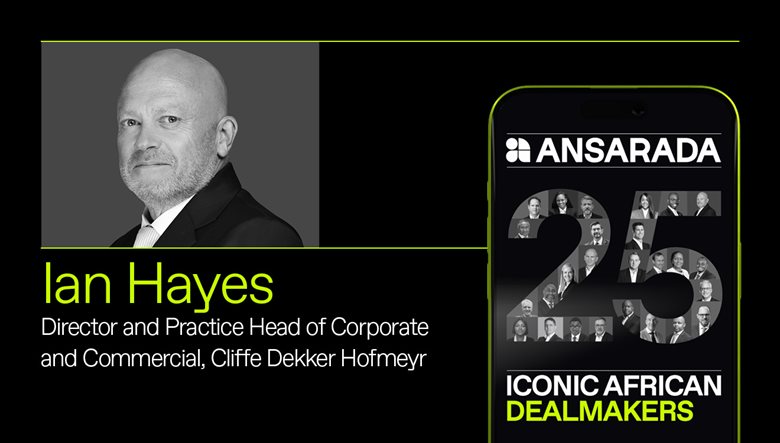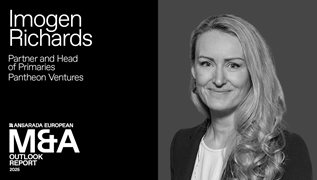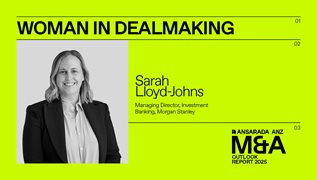Ian Hayes on resilience, regulation, and redefining deal-making in South Africa
With extensive expertise in mergers and acquisitions, private equity, corporate finance, capital markets, and business restructuring, Ian brings over three decades of experience to the legal and transactional landscape.
By AnsaradaThu Apr 17 2025Mergers and acquisitions, Due diligence and dealmaking, Advisors

Ian Hayes, a Director and the Head of CDH’s Corporate & Commercial practice, is recognized as one of South Africa’s foremost M&A specialists. With extensive expertise in mergers and acquisitions, private equity, corporate finance, capital markets, and business restructuring, Ian brings over three decades of experience to the legal and transactional landscape. In this Q&A, Ian shares his reflections on a remarkable career, the challenges and triumphs along the way, and the emerging trends that are poised to shape the future of South Africa’s corporate environment.
What inspired you to pursue a career in corporate finance and M&A?
How did those early motivations shape your journey? My journey began in 1991 when I started my articles with what was then Cliffe Dekker & Todd. During my articles, I rotated through several departments—property, litigation, and corporate and commercial.
Spending time in the corporate and commercial department reinforced that this was the area I wanted to pursue long-term. After completing my articles, I faced a challenging year in litigation due to firm policy, which required junior lawyers to gain experience there before drafting agreements. I didn’t enjoy litigation and even considered leaving law entirely, but I persevered, knowing I could eventually return to corporate and commercial.
That transition happened, and I was fortunate to work under Chris Ewing, who was the department head and later became the CEO and chairman of CDH. Chris was a tremendous influence—he was my boss, mentor, and trainer. He exposed me to significant transactional work early on and instilled values that have shaped my career for more than three decades.
You mentioned Chris Ewing instilled core values. What principles have guided you in navigating the complexities of deal-making, especially during challenging times?
Several principles have guided me over the years, many of which I learned from Chris and developed further through experience:
- Fair but firm: Many M&A lawyers get bogged down in unimportant details. My approach has always been to focus on what truly matters, understanding that there are two sides to every argument.
- Know your limitations: While I know a lot about M&A, I’m not an expert in competition or employment law. Knowing when to reach out for assistance is essential, especially in a full-service firm.
- Be available: Clients need to trust that they can reach you when necessary, even if it’s inconvenient.
- Under-promise and over-deliver: Meeting deadlines and exceeding expectations is always better than making promises you can’t keep.
- Own your mistakes: Everyone makes mistakes. Addressing them immediately and transparently is critical, even when it’s tough to swallow your pride.
Can you share a particularly challenging deal or moment in your career and what you learned from it?
The most challenging deal I’ve worked on was Harmony Gold’s hostile takeover attempt of Gold Fields in 2004–2005. It was one of South Africa’s most high-profile hostile takeovers and involved 17 legal challenges across competition authorities, the SRP (now TRP), and the courts, eventually reaching the Supreme Court of Appeal in record time.The transaction spanned six to nine months of intense work with little rest. While it was ultimately unsuccessful, it was career-defining. It taught me the importance of having a skilled, cohesive team and the resilience required to navigate such complex transactions. Hostile takeovers in South Africa are incredibly challenging due to the regulatory environment, and they require a high level of cooperation and strategic planning.
How has the regulatory environment for M&A evolved in South Africa, and where do you see it heading?
The regulatory environment has become increasingly complex, with public interest considerations now playing a significant role. Competition processes that used to take less than a year can now stretch to two years or more.For friendly transactions, pre-planning and engaging with regulators early are critical. Hostile takeovers, on the other hand, remain exceptionally challenging due to the inability to plan or consult regulators in advance. I foresee continued regulatory scrutiny, making thorough preparation and innovative deal structuring more important than ever.
What’s your outlook for deal-making and private equity in 2025?
I’m optimistic about 2025. While we’ve seen some decline in activity recently, I believe the prospects are promising. Mining and resources, particularly copper across Africa, will be a significant area of focus. Growth in TMT (Technology, Media, and Telecommunications), FinTech, and renewable energy is also expected.Private equity is another exciting area. There’s a lot of “dry powder” in the market—capital waiting to be deployed— and exits are becoming increasingly important. I anticipate significant activity in sectors like cybersecurity, education, and energy. ESG considerations will also play a larger role, especially for international investors. Overall, I expect some sizeable transactions and robust deal flow.
How do you see ESG shaping the future of deal-making in South Africa?
ESG is becoming increasingly important, particularly for attracting foreign investment. International investors are placing greater emphasis on companies demonstrating strong ESG compliance.While the environmental (“E”) aspect receives the most attention, the social (“S”) and governance (“G”) aspects are equally critical in South Africa. Valuing ESG remains a challenge because its impact is long-term, but I believe we’ll see it integrated into due diligence processes more comprehensively. Companies that prioritize ESG will gain a competitive edge in securing investment.
What trends are you seeing in deal structuring to bridge valuation gaps, especially given the longer timelines for competition approvals?
Earn-outs and deferred considerations tied to future performance are becoming more common. These mechanisms help align buyer and seller expectations, particularly in uncertain markets.One of the biggest challenges is timing. Transactions are taking much longer to close, which creates difficulties in maintaining value and relevance during the interim period. Long-stop dates, re-negotiations, and performance-based clauses like earn-outs are becoming standard tools to address these challenges.
As we celebrate 25 years of dealmakers in Africa with Ansarada, what advice would you give to aspiring dealmakers looking to make their mark?
First and foremost, success in this industry requires hard work, perseverance, and patience. Instant gratification isn’t part of deal-making. Young professionals need to dedicate themselves to learning and gaining experience.Passion and enjoyment are crucial. I’ve been fortunate to love what I do, which has driven my success. For young lawyers, my somewhat controversial advice is to spend more time in the office. Remote work has its place, but being physically present allows you to learn from colleagues in ways that virtual settings can’t replicate.
Finally, embrace challenges and setbacks as opportunities to grow. This industry is tough, but it’s incredibly rewarding for those who stick with it.


